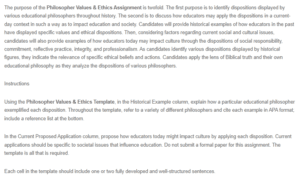Philosopher Values and Ethics
| DISPOSITION | HISTORICAL EXAMPLE
With Citation |
CURRENT PROPOSED APPLICATION |
| SOCIAL RESPONSIBILITY
Fairness, Justice, Equity |
John Rawls
John Rawls believed that citizens are free and equal, constituting the need for a fair society. He noted that someone does not decide where and how to be born. One does not decide to be born rich or poor, male or female, or in a particular racial group (Constitutional Rights Foundation, 2023). Hence, everyone is entitled to decent living and fair social cooperation regardless of who they are. |
The education system is responsible for integrating inclusive learning environments that accommodate and address the needs of all students regardless of their backgrounds or self-identity. All students should be given equal and fair treatment and opportunities for their academic development. A positive learning environment that upholds equity and fairness among all students promotes effective learning. |
| COMMITMENT
Work Ethic, Committed to the Field of Education |
John Dewey
John Dewey calls educators to take teaching an inquiry mindset. He encourages teachers to foster an energetic openness to possibilities and base their teaching practices on experience (Hargraves, 2021). Educators should use problems and challenges as opportunities for their growth to understand their surroundings. |
As educators integrate lessons, they should give their students opportunities to practice learning skills, enabling them to learn from experiences. Educators should foster a critical thinking culture in a class to help students engage in intellectual reflection, where they can evaluate and judge claims to make effective conclusions and in-depth understanding. |
| REFLECTION
Critical Analysis, Reform, Progress, Data-based Decisions |
Everett Dean Martin
Everett Dean Martin states that adults do not voluntarily participate in an activity to enhance their education value, but it is a growth supported through reflection (Day & Harbour, 2013). Martin encourages people to engage in reflective thinking to help understand adult education and how educated people differ from uneducated people.
|
Teachers should encourage students to reflect on the learned concepts to assess the skills and knowledge acquired in a particular class. At the end of a lesson, an educator can ask students questions to reflect on their learning or give them assignments to respond to some problems later. |
| INTEGRITY
Ethical Leadership |
Bernard Williams
According to Bernard Williams, an individual should be true to their commitments, which is characterized by their consistency in the choices of their actions (Moseley, 2014). Williams believed that consistent successful choice patterns depict a person’s moral virtue. Educators are encouraged to show consistency in their actions for accountability and reliability. |
Education is a professional that upholds his standards of integrity. An educator should be committed to their responsibility and accountable for their actions. Teachers should encourage students to practice integrity in their studies by following all governing roles and responsibilities and avoid engaging in malpractices such as plagiarism. Also, teachers should mentor the students in preparation for their future leadership roles. |
| PROFESSIONALISM
Effective Problem Solving |
Aristotle
Aristotle illustrates that effective problem-solving requires setting clear goals and objectives and dedicating efforts and determination to an issue. Individuals should analyze a situation and think critically to enhance effective decision-making while solving problems (Zandvakili et al., 2019).
|
Educators should mentor their students to become good problem solvers by focusing on a specific issue and analyzing its circumstances to take effective actions. Students should be aware that problems are part of their lives, and the best way to solve them is to face the issue with intelligence and engage in critical thinking to generate meaningful ideas. |
Are you seeking help on philosopher values and ethics? Contact us.
References
Constitutional Rights Foundation. (2023). BRIA 23 3 c Justice as fairness: John Rawls and his theory of justice. Constitutional Rights Foundation. Retrieved from https://www.crf-usa.org/index.php?option=com_content&view=article&id=1143&Itemid=0&catid=150
Day, M., & Harbour, C. P. (2013). The philosopher and the lecturer: John Dewey, Everett Dean Martin, and reflective thinking. Education and Culture, 29(1), 105-124.
Hargraves, D. V. (2021, January 18). Dewey’s educational philosophy. The Education Hub. Retrieved from https://theeducationhub.org.nz/deweys-educational-philosophy/
Moseley, D. D. (2014). Revisiting Williams on integrity. The Journal of Value Inquiry, 48, 53-68. doi: 10.1007/s10790-013-9402-0
Zandvakili, E., Washington, E., Gordon, E. W., Wells, C., & Mangaliso, M. (2019). Teaching patterns of critical thinking: The 3CA model—Concept maps, critical thinking, collaboration, and assessment. SAGE Open, 9(4), 2158244019885142. https://doi.org/10.1177/2158244019885142
ORDER A PLAGIARISM-FREE PAPER HERE
We’ll write everything from scratch
Question

Philosopher Values and Ethics
The purpose of the Philosopher Values & Ethics Assignment is twofold. The first purpose is to identify dispositions displayed by various educational philosophers throughout history. The second is to discuss how educators may apply the dispositions in a current-day context in such a way as to impact education and society. Candidates will provide historical examples of how educators in the past have displayed specific values and ethical dispositions. Then, considering factors regarding current social and cultural issues, candidates will also provide examples of how educators today may impact culture through the dispositions of social responsibility, commitment, reflective practice, integrity, and professionalism. As candidates identify various dispositions displayed by historical figures, they indicate the relevance of specific ethical beliefs and actions. Candidates apply the lens of Biblical truth and their own educational philosophy as they analyze the dispositions of various philosophers.
Instructions
Using the Philosopher Values & Ethics Template, in the Historical Example column, explain how a particular educational philosopher exemplified each disposition. Throughout the template, refer to a variety of different philosophers and cite each example in APA format; include a reference list at the bottom.
In the Current Proposed Application column, propose how educators today might impact culture by applying each disposition. Current applications should be specific to societal issues that influence education. Do not submit a formal paper for this assignment. The template is all that is required.
Each cell in the template should include one or two fully developed and well-structured sentences.


